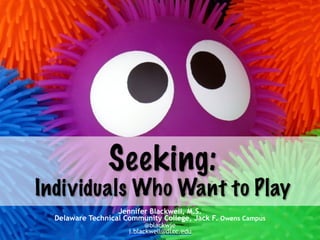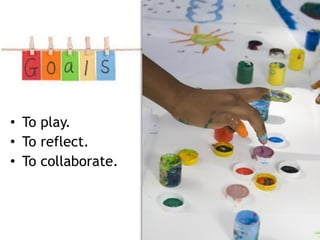Seeking Individuals Who Want to Play - Delaware State NACADA 2016
- 1. Seeking: 
 Individuals Who Want to Play Jennifer Blackwell, M.S. 
 Delaware Technical Community College, Jack F. Owens Campus @blackwje
 j.blackwell@dtcc.edu
- 2. 2 Welcome to #NACADADelaware, 
 we are glad you are here! !
- 3. • To play. • To reflect. • To collaborate.
- 7. What is Play? • A response to new experiences where content & meaning are uncertain
 • Hands-on problem- solving 
 • Collaboration in action
- 11. In areas of the room, there are random every day items. ! Find an area that feels most comfortable to you, and working together with the individuals who join you - build a new construction that hasn’t existed in time or space before. 
 It can be something you use, you wear, you see, etc. ! ! Try to use all of the materials available when feasible.
- 12. Time to Reflect
- 13. Are we learning? • Builds problem-solving, persistence & collaboration skills • Play = reflective learning strategy • Positively contribute to society
- 14. Ideas!
- 15. • 20% time to creatively work on what they think will most benefit the company • Only 10% of employees are consistently doing this (as of April, 2015) and it has no management oversight • HR Director of Google: “The idea of it is more important than the reality of it…the most talented and creative people can’t be forced to work.” 
 
 BusinessInsider.com (April 17, 2015) Play at work…
- 16. 16 • Nerf Stations in Student Activities office • Biology Instructor who would breakdown equipment of focus in lab for given project • Company at career fair interviewing (unknowing) applicants through a puzzle for free flip flops • Starting meeting with word of the day More Personal Examples of Play at Work
- 17. Resources • PlayMaker schools of Santa Monica, CA – Play, Make, Discover in Interest- Driven Curriculum
 • MIT Media Lab – Lifelong Kindergarten – Playful Systems
 • EdSurge – Do, Design, Discover Training Workshops ! • THNK.org – Google, Zappos
- 18. Resources • Paulo Freire’s Pedagogy of the Oppressed (1970) – Generate experiences from within
 • 50 Ways to Use Your Noodle / Chicken & Noodle Games – Games with innovative equipment
 • The Processing Pinnacle – Educator’s guide to processing experiential learning
- 22. 22 Thank you for learning with us! ! Evaluate: Please complete your session evaluation and add it to the stack as you exit, please. ! Commit: What do you commit to doing as a result of participating in this session? Tweet your commitment using #NACADADelaware
- 23. Jennifer Blackwell, M.S. 
 Delaware Technical Community College 
 Jack F. Owens Campus j.blackwell@dtcc.edu @blackwje























